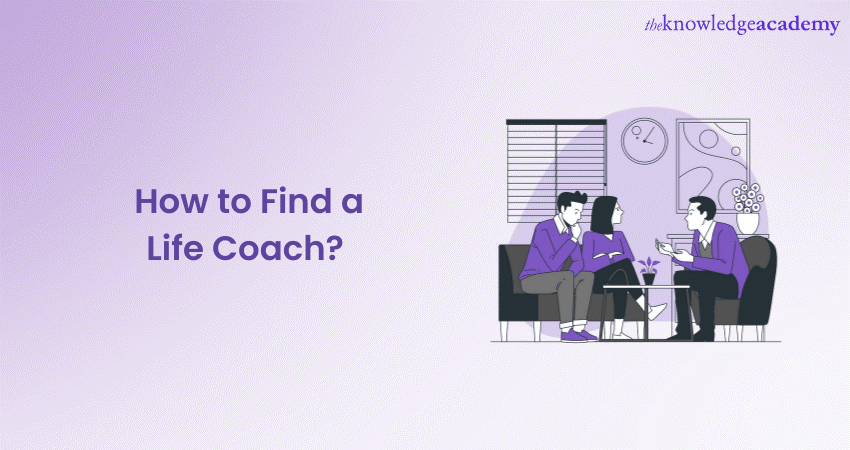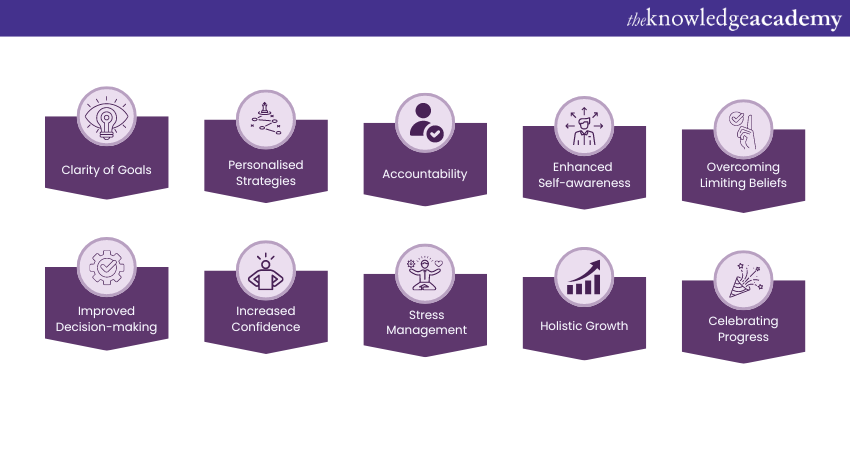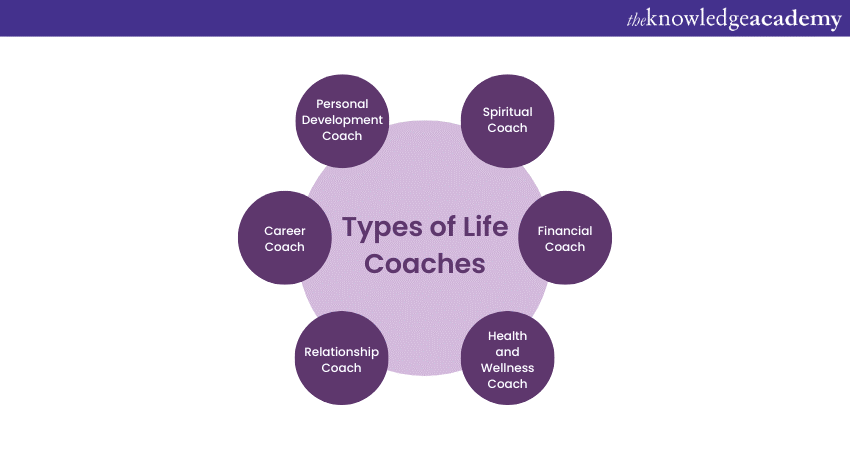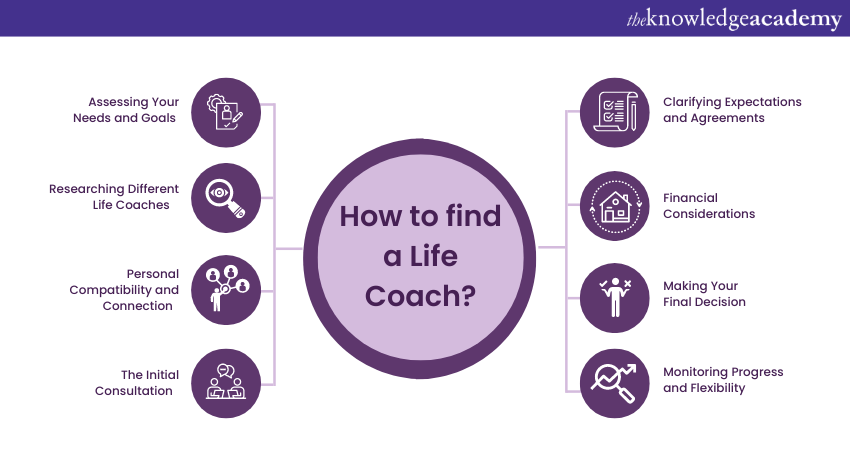We may not have the course you’re looking for. If you enquire or give us a call on +44 1344 203999 and speak to our training experts, we may still be able to help with your training requirements.
Training Outcomes Within Your Budget!
We ensure quality, budget-alignment, and timely delivery by our expert instructors.

If you’re feeling stuck in life, a personal Life Coach can be your compass to navigate challenges and unlock your full potential. These coaches offer personalised guidance, helping you clarify goals, overcome obstacles, and build resilience.
Reportedly, with over 109,200 Life Coaches worldwide, finding the right match might seem daunting. Fear not! Hence, this blog will take you through the strategies on How to Find a Life Coach who can help you unlock your full potential.
Table of Contents
1) Understanding the Role of a Life Coach
2) Benefits of Having a Life Coach
3) Signs That You Need a Life Coach
4) Exploring the Types of Life Coaches
5) How to Find a Life Coach
6) Conclusion
Understanding the Role of a Life Coach
A Life Coach is a trained professional who guides individuals set and achieve goals, improve their quality of life, and develop new skills. They provide guidance, accountability, and support, acting as catalysts for positive change.
Life Coaches listen attentively, ask thought-provoking questions, and offer objective perspectives to help clients gain insights into their thoughts and behaviours. This collaborative process helps individuals understand their strengths and areas for growth.
Life Coaches bridge the gap between where you are and where you want to be, offering a supportive environment to explore dreams, overcome challenges, and create a path towards personal transformation. With their guidance, you’ll not only reach your aims but also develop the skills and mindset needed to navigate life’s challenges with resilience and clarity.
Step up for your health! Experience the transformative power of Healthy Lifestyles Training today!
Benefits of Having a Life Coach
A Life Coach acts as a partner in your journey of self-discovery and growth. Here are some key ways a Life Coach can transform your life:

1) One major benefit of a Life Coach is gaining clear, well-defined goals. They help you articulate your aspirations, giving you a clear direction to focus your energy on what truly matters.
2) Life Coaches provide personalised strategies tailored to your unique circumstances. They help identify practical methods to overcome challenges and achieve your goals through thoughtful conversations and assessments.
3) A Life Coach serves as a supportive accountability partner, helping you stay motivated and committed. Regular check-ins and progress evaluations ensure you consistently move toward your objectives.
4) Life Coaches aid in exploring your strengths, weaknesses, values, and beliefs, fostering self-awareness. This empowers you to make conscious choices aligned with your authentic self.
5) Life Coaches help identify and challenge limiting beliefs, replacing them with empowering thoughts that support growth and success.
6) Life Coaches assist in developing better decision-making skills by encouraging you to consider different perspectives, weigh options, and align choices with long-term goals.
7) As you work toward your goals and witness progress, your confidence naturally grows. Life Coaches celebrate your achievements, reinforcing your belief in your capabilities.
8) Life Coaches incorporate stress management techniques into their approach, providing strategies to cope with stress and maintain emotional well-being, ensuring you handle life's challenges effectively.
9) Life Coaching considers various aspects of your life—career, relationships, health, and personal development—helping you achieve balance and fulfilment in all areas.
10) Life Coaches help you appreciate even the smallest achievements, boosting motivation and reminding you of the progress you're making.
Elevate your well-being with our Active and Healthy Lifestyles Training, join now for a healthier tomorrow!
Signs That you Might Need a Life Coach
Wondering if you could benefit from a Life Coach? Look out for these signs:
a) Feeling stuck and unfulfilled in your current situation.
b) Struggling to set and achieve meaningful goals.
c) Seeking clarity about your life's purpose and direction.
d) Facing a major life transition and needing guidance.
e) Wanting to improve specific areas like time management, relationships, or career advancement.
Exploring the Types of Life Coaches
Life Coaching is a diverse field with coaches specialising in various areas, including:

1) Personal Development Coach: Focuses on overall personal growth and self-improvement.
2) Career Coach: Assists with career planning, transitions, and advancement.
3) Relationship Coach: Helps individuals improve their interpersonal relationships.
4) Health and Wellness Coach: Guides in making healthier lifestyle choices.
5) Financial Coach: Provides guidance on managing finances and achieving financial goals.
6) Spiritual Coach: Assists in exploring and deepening spiritual beliefs.
How to Find a Life Coach?
Generally, a Life Coach helps you identify and achieve your personal and professional goals. They encourage you to take actionable steps, make smart decisions, and create a plan for personal growth and success. Now, let’s begin the process of finding the right Life Coach for you:

1) Assessing Your Needs and Goals
The first step in finding the right Life Coach is to assess your needs and goals. Take some time to reflect on what areas of your life you want to improve, whether your career, relationships, or wellness.
Start by asking yourself some crucial questions:
1) What areas of my life do I want to improve?
2) What specific goals do I want to achieve? (e.g., career advancement, better relationships, personal growth)
3) What challenges or problems am I facing?
4) What changes do I want to see in my life?
5) How committed am I to making these changes?
This self-reflection will help you define your objectives and set the tone for your coaching relationship. Keep your answers in mind as you move forward in your search.
2) Researching Different Life Coaches
Once you've gained clarity on your needs and goals, it's time to research potential Life Coaches. This step involves exploring various aspects of each coach's background and approach to decide the best fit for you.
a) Credentials and Qualifications
a) Check for relevant training and certifications.
b) Look for accreditation from reputable organisations like ICF.
b) Coaching Specialties
a) Ensure the coach's specialisation aligns with your goals.
b) Expertise in your desired area offers tailored strategies.
c) Testimonials and Reviews
a) Review client success stories for insights.
b) Focus on consistent themes in feedback.
3) Personal Compatibility and Connection
1) Personal Connection:
a) Personal compatibility enhances the coaching relationship.
b) Effective collaboration relies on mutual understanding.
2) Initial Consultations:
a) Many coaches offer free initial consultations.
b) Use this opportunity to assess compatibility.
3) Communication and Comfort:
a) Evaluate how well you communicate.
b) Ensure you feel comfortable discussing your goals and problems.
4) Trust and Understanding:
a) A sense of trust can significantly impact the success of your coaching journey.
Experience the profound benefits of meditation and mindfulness with our Meditation Course – register today and find your calm!
4) The Initial Consultation
Schedule consultations with your top choices. The initial consultation serves as a mutual assessment between you and the coach. During this session, be prepared to share your objectives, challenges, and expectations. Equally important, use this opportunity to evaluate the coach's responses and determine if their approach resonates with you. A skilled coach will listen actively, ask probing questions, and showcase a genuine interest in your success.
5) Clarifying Expectations and Agreements
Before committing to a coaching relationship, it's crucial to clarify expectations and set clear agreements. This step ensures that both you and the coach are aligned on how the coaching process will unfold. Topics to discuss include:
a) Frequency and duration of sessions
b) Preferred communication methods (in-person, phone, video calls)
c) Homework or assignments between sessions
d) Boundaries and Confidentiality
e) How progress will be measured
Creating a shared understanding of these aspects sets the foundation for a productive coaching partnership and minimises misunderstandings as you progress.
6) Financial Considerations
While cost is a factor to consider, remember that investing in a Life Coach is a great investment in your personal development and growth. Coaching fees can vary widely based on factors such as the coach's experience, specialisation, and geographic region. It's recommended to inquire about fees upfront and check whether they align with your budget. Keep in mind that the benefits you gain from effective coaching can far outweigh the initial financial investment.
7) Making Your Final Decision
Careful consideration is crucial as you approach the pivotal moment of selecting a Life Coach. Reflect on the bond established during consultations, the resonance between your goals and the coach's expertise, and the compatibility of communication styles.
Evaluate each potential Life Coach based on their ability to understand your aspirations and challenges. Consider their coaching philosophy, approach, and strategies to ensure they align with your values and preferences. Trust your intuition; the coach who genuinely resonates with you is likely the one who can guide you most effectively.
Join our Yoga Training and start your journey to a more flexible, strong, and peaceful life – book your spot now!
8) Monitoring Progress and Flexibility
Regularly monitor your progress toward your goals as you engage in coaching sessions. A skilled coach will work with you to assess the effectiveness of your strategies. If you find that certain approaches aren't giving the desired results, be open and discuss it with your coach. A coach's flexibility to adapt the coaching process based on your evolving needs is a sign of their commitment to your success.
Conclusion
With the insights from our blog, “How to Find a Life Coach,” you’re equipped to choose a coach who aligns with your goals and values. Remember, the right Life Coach can make a significant difference in your personal and professional development. By considering their credentials, specialties, and personal compatibility, you can find a coach who truly understands and supports your aspirations. We believe that with the right guide by your side, you can unlock your potential and achieve your dreams.
Enhance your skills and transform lives with our Cognitive Behavioural Therapy Training - register today for a rewarding career in promoting mental well-being.
Frequently Asked Questions

Reputable sources to find certified life coaches include the International Coach Federation (ICF), the Centre for Credentialing & Education (CCE), and the International Association of Coaching (IAC). These organisations maintain directories of accredited coaches.

Yes, certifications ensure that a life coach has undergone proper training, adheres to ethical standards, and is committed to continuous professional development.

The Knowledge Academy takes global learning to new heights, offering over 30,000 online courses across 490+ locations in 220 countries. This expansive reach ensures accessibility and convenience for learners worldwide.
Alongside our diverse Online Course Catalogue, encompassing 17 major categories, we go the extra mile by providing a plethora of free educational Online Resources like News updates, Blogs, videos, webinars, and interview questions. Tailoring learning experiences further, professionals can maximise value with customisable Course Bundles of TKA.

The Knowledge Academy’s Knowledge Pass, a prepaid voucher, adds another layer of flexibility, allowing course bookings over a 12-month period. Join us on a journey where education knows no bounds.

The Knowledge Academy offers various Healthy Lifestyles Training, including the Life Coach Training, Yoga Training, and Meditation Course. These courses cater to different skill levels, providing comprehensive insights into what is a life coach.
Our Health and Safety Blogs cover a range of topics related to Life Coaching, offering valuable resources, best practices, and industry insights. Whether you are a beginner or looking to advance your Health and Safety knowledge, The Knowledge Academy's diverse courses and informative blogs have got you covered.







 Top Rated Course
Top Rated Course




 If you wish to make any changes to your course, please
If you wish to make any changes to your course, please


